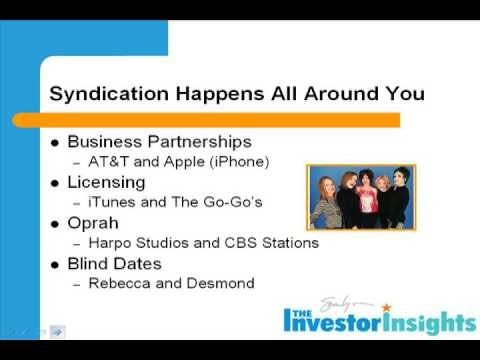5 Secrets to Successful Real Estate Partnerships
Post on: 10 Июль, 2015 No Comment

One good thing about being young is that you are not experienced enough to know you cannot possibly do the things you are doing. Gene Brown
The smartest thing my husband and I did to build our multimillion dollar real estate portfolio in under eight years was to find a couple of great partners.
As I reflect back on the things that my husband and I did in the last eight years to become millionaires I think that f inding good properties in areas with promising economic futures, and buying them with good partners was the key to our success.
Partners can bring cash to the table if you don’t have enough, they share the risk on a venture and can also provide mentoring or advice. A good partner, in our experience, brings something to the deal that you don’t have. If you and your partner have experience but no money, you will be stuck. If you both have money but no idea what you’re doing, it will be messy. But if one partner has experience and the other has money, it’s a foundation for a solid partnership.
It’s not a guaranteed great match just because you have the expertise and they have the money! There are some other things to consider before you partner with someone on a real estate investment.
Here’s what we’ve learned are the secrets to successful real estate investing partnerships:
1. Common Objectives
Some people have the expectation that buying investment property is their ticket to overnight wealth. Or they think that just a couple of deals will give them enough cashflow to retire on, but the techniques that can create giant amounts of cash flow or that are more instant in their wealth creation are extremely high risk gambles that pay off for only a few. For many others they can lead to a lot of problems, including bankruptcy in extreme cases.
Before we decide to partner with anyone, we make sure that they have similar fundamental objectives for their real estate investing as we do. When we buy real estate, we buy properties that will have positive cash flow within 12 months of purchasing it, and that we plan to hold it for a minimum of 5 years, but more realistically, 10 15 years.
As long as our partner has a similar mindset, and is comfortable investing their money for the long term, then we can continue discussing our partnership.
2. Begin with the End in Mind
It’s a throw back to Stephen Covey’s Seven Habits of Highly Effective People. where he says“Begin with the End in Mind”. It’s important to discuss with your partners how either one of you can get out of the deal in the future if it’s critical. For example, if you buy a duplex and each have 50% ownership, but down the road, your partner comes on hard times and needs the equity from the property. You have three options:
1. Sell the property
2. Buy your partner out
3. Find another partner to buy out your partner.
You could also do nothing, or give your partner a loan against their share in the property, but realistically you’d probably consider one of the three options.
What you need to discuss and have written into a partnership agreement is how you will value the property if you choose to buy your partner out or find another partner to buy out your partner. You should also note that any new partner must be 100% satisfactory to you. In other words, your current partner should not go out and find a new partner for you and sell their share without consulting you.
3. Be Fair
It’s not always easy coming up with $20,000, $30,000 or more for a down payment on a property. And, although we are millionaires on paper, that doesn’t mean we always have chunks of cash lying around ready for the next super property deal. But because we have a few partners that almost always have money sitting around, and because they’ve made great money with us in the past and they trust us to make good decisions, they are always willing to consider new deals from us. And, they selectively tell their friends. Because, what you’ll find, is that people with money, often have friends with money. Over time, you can find yourself with a really solid group of people willing to provide the down payment for future deals.

Just because someone is waving a stack of $100 bills in your face, doesn’t mean you should throw them on the first deal that comes your way.The secret to long term and high quality partnerships is to spend your partners money even more frugally than you would spend your own. This means you NEVER put someone else’s money into a deal you wouldn’t put your own money into. You NEVER take a cut that is unreasonable for the amount of work you’re doing relative to the amount of money they are putting in, and you NEVER make major decisions without consulting your partners.
4. Under-promise and Over-deliver
Not too long ago, our main partner introduced us to a friend of his. As the two friends were discussing their businesses and their investments, our partner realized that this person would make a great addition to our team. When we met for coffee my husband and I communicated our failures in investing as well as our successes. And we clearly told him that we aim for neutral cashflow properties that we hold for the long term.
What we told him is not totally true though. We aim for positive cash flow. But, we always try to undersell ourselves and then over deliver. Wed do the same on a specific deal. Wed tell him that we expect it to break even, but really were expecting it to be postive.
If you tell someone that a property is going to bring in $500/month in positive cash flow, and then it only brings in $380 each month, they will be disappointed. But if you tell them that the property will be neutral cash flow, and then it brings in $380 they will be thrilled.
We’d rather undersell someone and have them decide not to invest with us than over sell, have them invest with us, be disappointed, and be an unhappy partner.
5. Communicate Regularly
We partner with people that don’t expect us to give them a glossy annual report each year. They don’t expect a weekly progress report. We do, however, always give them updates and advance notice of money coming in and going out. And, we keep them up to date on the property. If a tenant moves out, we let them know. When the unit is filled again, we let them know. If we foresee a major expense coming, we give them a heads up. If we just learned of some recent sales in the area that indicate our property has gone up in value we let them know. If there is bad news in the market, we will reassure them about their investments. But, we do this informally. A quick phone call or an email when there is something to tell them.
And, if they call or email us, we get back to them right away. If you have money in the bank and you want to check on it, but nobody is answering your calls and you can’t get online to see how your money is doing, you will lose confidence in that bank. The same will happen to your partner if they can’t talk to you when they need you.
We found that because we take care in choosing our partners, and ensure we are all “singing from the same song sheet”, we rarely get calls from our partners. And, we also find that our circle of trusted partners is growing without us trying. And thank goodness, because now that I am retired from my job, and my husband is close to doing the same, we’ll have more time to find great deals, but less cash coming in to pay for them!














